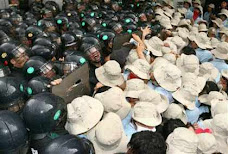
May 10, 2008
U.N. Suspends Aid Supplies to Myanmar
By SETH MYDANS
BANGKOK — The United Nations suspended relief supplies to Myanmar on Friday after the military government seized the food and equipment it had already sent into the country.
Earlier, in a statement, Myanmar’s military junta said it was willing to receive disaster relief from the outside world but would not welcome outside relief workers. Nearly one week after a devastating cyclone, supplies into the country were still being delayed and aid experts were being turned back as they arrived at the airport.
In the statement, the government said it would distribute international relief supplies itself.
Paul Risley, a spokesman for the United Nations World Food Program, said, "all the food aid and equipment that we managed to get in has been confiscated." He said the World Food Program was suspending the few flights that the Myanmar authorities had so far allowed to enter the country until the matter was resolved.
Myanmar said it had turned back one relief flight because, in addition to disaster relief supplies, it carried disaster assessment experts and an unauthorized media group.
"Myanmar is not in a position to receive rescue and information teams from foreign countries at the moment," the statement, from the Foreign Ministry, said. “But at present Myanmar is giving priority to receiving relief aid and distributing them to the storm-hit regions with its own resources."
The first of two major international aid shipments arrived Thursday by aircraft from the United Nations World Food Program, carrying high energy biscuits, water containers, food and plastic sheets.
But two of four United Nations experts who flew in on Friday were turned back at the airport for unknown reasons, said John Holmes, a relief coordinator for the United Nations.
Altogether, by one count, 11 chartered planes with relief supplies have landed in Myanmar, a tiny amount for a disaster that the United Nations said has affected 1.5 million people.
By the government’s official count, 22,500 people have died, but Shari Villarosa, the top American diplomat in Myanmar, said the number could reach 100,000 if help was not prompt and the humanitarian situation worsened.
One United Nations official said he had never seen delays like this before in delivering relief supplies and aid officials. In Indonesia after the tsunami in 2004, he said, an air bridge of daily flights was established within 48 hours.
"The frustration caused by what appears to be a paperwork delay is unprecedented in modern humanitarian relief efforts," said the official, Paul Risley, a spokesman for the United Nations World Food Program, in Bangkok. "It’s astonishing."
He said his agency alone had submitted 10 visa applications for relief workers but that none had been approved before consulates shut down for the weekend.
"We strongly urge the government of Myanmar to process these visa applications as quickly as possible, including working over the weekend," he said.
In Thailand, in addition to aid workers United States Air Force transport aircraft and helicopters waited at an airport for permission to enter Myanmar with supplies.
"We are in a long line of nations who are ready, willing and able to help, but also, of course, in a long line of nations the Burmese don’t trust," said United States Ambassador Eric John.
He said that on Thursday Myanmar appeared to agree to accept American aid, but then said it would not accept the aid. He said it was not clear whether there had been a misunderstanding or a change of mind.
Also in Bangkok it appeared that Prime Minister Samak Sundaravej had changed his mind about visiting Myanmar to discuss the relief operation, canceling the trip because the leaders would not welcome aid workers.
"After they said today they would not welcome foreign staff, there is no point of me going there," Mr. Samak said.
In New York, United Nations officials all but demanded Thursday that the government open its doors.
"The situation is profoundly worrying," said Mr. Holmes, the United Nations official in charge of the relief effort, speaking in unusually candid language for a diplomat. "They have simply not facilitated access in the way we have a right to expect."
Mr. Holmes’s predecessor in that job, Jan Egeland, said, "children are going to die from diarrhea because of this government’s inaction."
The cyclone struck a country particularly ill-equipped to deal with a public health catastrophe, said Dr. Chris Beyrer, an epidemiologist at Johns Hopkins who has worked extensively in Myanmar.
Under the military government, the public health infrastructure has been crumbling for decades, he said.
Malaria is already endemic, and many people with AIDS and tuberculosis are going untreated, he said. "We don’t think the blood supply is safe or adequately screened," Dr. Beyrer said, adding that people injured in the storm and in need of transfusions face the risk of infection and blood-borne diseases.
In Geneva on Friday, a United Nations spokeswoman said the United Nations was putting together an urgent appeal for funding that would cover its relief efforts in Myanmar over the next six months.































No hay comentarios:
Publicar un comentario